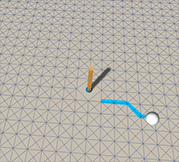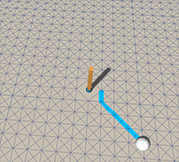|
A* Pathfinding Project
4.0.5
The A* Pathfinding Project for Unity 3D
|
|
A* Pathfinding Project
4.0.5
The A* Pathfinding Project for Unity 3D
|
Extended Path.
This is the same as a standard path but it is possible to customize when the target should be considered reached. Can be used to for example signal a path as complete when it is within a specific distance from the target.
Public Member Functions | |
| XPath () | |
 Public Member Functions inherited from ABPath Public Member Functions inherited from ABPath | |
| ABPath () | |
| Default constructor. | |
Static Public Member Functions | |
| static new XPath | Construct (Vector3 start, Vector3 end, OnPathDelegate callback=null) |
 Static Public Member Functions inherited from ABPath Static Public Member Functions inherited from ABPath | |
| static ABPath | Construct (Vector3 start, Vector3 end, OnPathDelegate callback=null) |
| Construct a path with a start and end point. | |
Public Attributes | |
| PathEndingCondition | endingCondition |
| Ending Condition for the path. | |
 Public Attributes inherited from ABPath Public Attributes inherited from ABPath | |
| bool | calculatePartial |
| Calculate partial path if the target node cannot be reached. | |
| GraphNode | endNode |
| End node of the path. | |
| Vector3 | endPoint |
| End point of the path. | |
| Vector3 | originalEndPoint |
| End Point exactly as in the path request. | |
| Vector3 | originalStartPoint |
| Start Point exactly as in the path request. | |
| Int3 | startIntPoint |
| Start point in integer coordinates. | |
| GraphNode | startNode |
| Start node of the path. | |
| Vector3 | startPoint |
| Start point of the path. | |
 Public Attributes inherited from Path Public Attributes inherited from Path | |
| OnPathDelegate | callback |
| Callback to call when the path is complete. | |
| int | enabledTags = -1 |
| Which graph tags are traversable. | |
| Heuristic | heuristic |
| Determines which heuristic to use. | |
| float | heuristicScale = 1F |
| Scale of the heuristic values. | |
| OnPathDelegate | immediateCallback |
| Immediate callback to call when the path is complete. | |
| NNConstraint | nnConstraint = PathNNConstraint.Default |
| Constraint for how to search for nodes. | |
| List< GraphNode > | path |
| Holds the path as a Node array. | |
| ITraversalProvider | traversalProvider |
| Provides additional traversal information to a path request. | |
| List< Vector3 > | vectorPath |
| Holds the (possibly post processed) path as a Vector3 list. | |
Protected Member Functions | |
| override void | CalculateStep (long targetTick) |
| Calculates the path until completed or until the time has passed targetTick. | |
| override void | CompletePathIfStartIsValidTarget () |
| The start node need to be special cased and checked here if it is a valid target. | |
| override bool | EndPointGridGraphSpecialCase (GraphNode endNode) |
| Applies a special case for grid nodes. | |
| override void | Reset () |
| Reset all values to their default values. | |
 Protected Member Functions inherited from ABPath Protected Member Functions inherited from ABPath | |
| override void | Cleanup () |
| Always called after the path has been calculated. | |
| override void | Initialize () |
| Initializes the path. | |
| override void | Prepare () |
| Prepares the path. | |
| void | UpdateStartEnd (Vector3 start, Vector3 end) |
| Sets the start and end points. | |
| void | Setup (Vector3 start, Vector3 end, OnPathDelegate callbackDelegate) |
 Protected Member Functions inherited from Path Protected Member Functions inherited from Path | |
| void | DebugStringPrefix (PathLog logMode, System.Text.StringBuilder text) |
| Writes text shared for all overrides of DebugString to the string builder. | |
| void | DebugStringSuffix (PathLog logMode, System.Text.StringBuilder text) |
| Writes text shared for all overrides of DebugString to the string builder. | |
| virtual void | OnEnterPool () |
| Called when the path enters the pool. | |
| void | PrepareBase (PathHandler pathHandler) |
| Prepares low level path variables for calculation. | |
| virtual void | ReturnPath () |
| Calls callback to return the calculated path. | |
| virtual void | Trace (PathNode from) |
| Traces the calculated path from the end node to the start. | |
Private Member Functions | |
| void | ChangeEndNode (GraphNode target) |
| Changes the endNode to target and resets some temporary flags on the previous node. | |
Additional Inherited Members | |
 Protected Attributes inherited from ABPath Protected Attributes inherited from ABPath | |
| int[] | endNodeCosts |
| Saved original costs for the end node. | |
| PathNode | partialBestTarget |
| Current best target for the partial path. | |
 Package Functions inherited from ABPath Package Functions inherited from ABPath | |
| override string | DebugString (PathLog logMode) |
| Returns a debug string for this path. | |
| override uint | GetConnectionSpecialCost (GraphNode a, GraphNode b, uint currentCost) |
| May be called by graph nodes to get a special cost for some connections. | |
 Package Attributes inherited from Path Package Attributes inherited from Path | |
| float | duration |
| How long it took to calculate this path in milliseconds. | |
| Path | next |
| Internal linked list implementation. | |
 Properties inherited from ABPath Properties inherited from ABPath | |
| virtual bool | hasEndPoint [get] |
| Determines if a search for an end node should be done. | |
| XPath | ( | ) |
|
protectedvirtual |
Calculates the path until completed or until the time has passed targetTick.
Usually a check is only done every 500 nodes if the time has passed targetTick. Time/Ticks are got from System.DateTime.UtcNow.Ticks.
Basic outline of what the function does for the standard path (Pathfinding.ABPath).
Reimplemented from ABPath.
|
private |
|
protectedvirtual |
The start node need to be special cased and checked here if it is a valid target.
Reimplemented from ABPath.
|
static |
|
protectedvirtual |
Applies a special case for grid nodes.
Assume the closest walkable node is a grid node. We will now apply a special case only for grid graphs. In tile based games, an obstacle often occupies a whole node. When a path is requested to the position of an obstacle (single unwalkable node) the closest walkable node will be one of the 8 nodes surrounding that unwalkable node but that node is not neccessarily the one that is most optimal to walk to so in this special case we mark all nodes around the unwalkable node as targets and when we search and find any one of them we simply exit and set that first node we found to be the 'real' end node because that will be the optimal node (this does not apply in general unless the heuristic is set to None, but for a single unwalkable node it does). This also applies if the nearest node cannot be traversed for some other reason like restricted tags.
Image below shows paths when this special case is applied. The path goes from the white sphere to the orange box.

Image below shows paths when this special case has been disabled

Reimplemented from ABPath.
|
protectedvirtual |
Reset all values to their default values.
All inheriting path types must implement this function, resetting ALL their variables to enable recycling of paths. Call this base function in inheriting types with base.Reset ();
Reimplemented from ABPath.
| PathEndingCondition endingCondition |
Ending Condition for the path.
The ending condition determines when the path has been completed. Can be used to for example signal a path as complete when it is within a specific distance from the target.
If ending conditions are used that are not centered around the endpoint of the path you should also switch the heuristic to None to make sure that optimal paths are still found. This has quite a large performance impact so you might want to try to run it with the default heuristic and see if the path is optimal in enough cases.